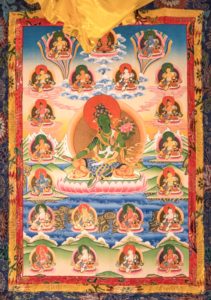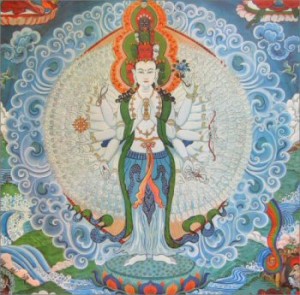An excerpt from a teaching called How Buddhism Differs from Other Religions by Jetsunma Ahkon Lhamo When we begin to practice the Buddha dharma and really engage in practice, we begin by practicing generation stage teaching. And what that means is you learn to generate yourself as the deity. You learn to dissolve your ordinary constituents. Boom. You just dissolve. This is your visualization. And then you give rise to yourself as a seed syllable, and then from the seed syllable, you become the deity. Tara, Vajradhara, Manjushri. Any of those. You become that deity, and you give rise to Vajra pride. It’s not like “Ha Ha. I’m the deity and you’re not.” It’s the realization of your nature and the nobility of that. And you become that very deity, and you begin to develop the qualities of that deity by reciting the mantra and practicing the hand implements. Eventually when you accomplish the deity, at that very moment you come to understand that you are not separate from that deity and that deity is your very nature. As we move on to practice the Guru Yoga, we realize that the teacher on the throne that we revere and think has great wisdom and great bodhicitta, has special qualities. When you really accomplish Guru Yoga, you mix your mindstream with the Guru’s mindstream like milk with water. And they become so inseparable that in the end you realize that your own root guru is the very display of your mind. How amazing! That’s how deep this path is. And to practice it superficially is crazy. You can do that anywhere else. You can be superficial anywhere you want to, but to come here and practice, you should practice deeply. Please take to heart aspirational prayers, and developing the habit of making aspirational prayers. Please start there right now, and give rise to the understanding that all are the same in our nature, and that we all wish to be happy. The happiest people in the world are people who are happy in their own mind. Those that have awakened and have realized, are filled with the streaming bliss of the bodhicitta. There’s no unhappiness. There’s no drama. There’s no BS. You see? And that’s how we know we’re making it.
© Jetsunma Ahk
![DSC_4465-940-glass-of-tap-water[1]](https://www.tibetanbuddhistaltar.org/wp-content/uploads/2010/09/DSC_4465-940-glass-of-tap-water1-300x225.jpg)

![9PrayBuddha[1]](https://www.tibetanbuddhistaltar.org/wp-content/uploads/2010/09/9PrayBuddha1-225x300.jpg)
![tool-box[1]](https://www.tibetanbuddhistaltar.org/wp-content/uploads/2010/09/tool-box1-300x197.jpg)
![41BY60OUk8L[1]](https://www.tibetanbuddhistaltar.org/wp-content/uploads/2010/09/41BY60OUk8L1-300x249.jpg)
![sandwiches[1]](https://www.tibetanbuddhistaltar.org/wp-content/uploads/2010/09/sandwiches1.jpg)

![seesaw_12ft[1]](https://www.tibetanbuddhistaltar.org/wp-content/uploads/2010/08/seesaw_12ft1-300x280.jpg)

